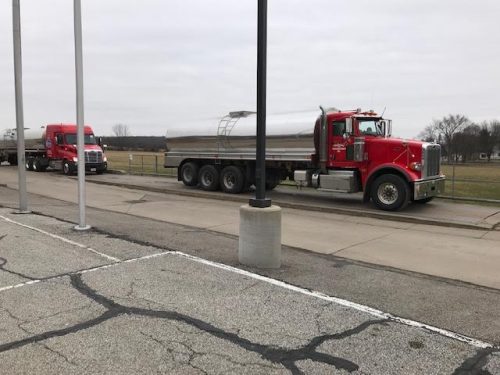I like
My grandkids live on Cheese Factory Rd in Honeoye Falls, New York. (More about this in another post later.)
My Great-
My paternal grandfather Evert Huskonen was a dairy farmer in Williamsfield, Ashtabula County, Ohio. Right across the road from his farm was the dairy farm of Andrew Dingman, my great-great-grandfather. Also in Williamsfield, my Uncle Hugh Huskonen owned and operated a dairy farm. Finally, my late brother-in-law Sydney VanCourt operated a dairy farm in Richmond Center, Ashtabula County, beginning as a teenager and continuing until illness forced him to sell off his cows and property.
So as a child I was familiar with dairy farms, milking parlors, and regular milk pick-ups by milk trucks delivering milk to dairies. I also was somewhat familiar with the progress in dairy farming as it changes from hand-milking to machine-milking, and from milk cans to large cooling vats for handling and storing milk. And finally, I was familiar with the seven-day-a-week requirement that dairy farmers be available to milk their cows.
On this past Saturday, I drove out to Middlefield, Geauga County, Ohio to visit the Rothenbuler Cheese Chalet.

I visited the store and bought some different kinds of cheese. I then watched a 15-min video showing the history of Hans Rothenburger and his cheese-making company. It turns out that he immigrated from Switzerland, where his father was a master cheesemaker.

As I was leaving the Chalet, I saw a truck pulling onto a weigh station. It obviously was a “milk truck” with its stainless steel tank. I took a closer look and on the truck door was painted a logo “Mitchell’s, Saegertown, PA.”

Here is another connection. My Four-Great-Grandfather Matthias Flaugh lived in that area of Crawford County, Pennsylvania, and he is buried in a small Saegertown cemetery. He was a farmer and no doubt he had cows. But I doubt that he sent any milk to a dairy or other processing operation.
With the power of Google, I learned quite a bit about Mitchell’s and why this truck was being weighed in at Rothenbuhler’s. An article published by the Meadville Tribune told about the Mitchell brothers who own and operate the trucking company that was delivering milk while I was visiting Rothenbuhler Cheese Chalet. I am reproducing the article here:
Milk more than just business for Ag-Industry Award winner
By Keith Gushard, Meadville Tribune, Jul 3, 2017
Mitchells Brothers Mike and Greg Mitchell pose near one of their milk hauling truck at Mitchell’s Milk Hauling in Saegertown. The business is a recipient of the 2017 Crawford County Ag-Industry Award.
After six decades in operation, hauling milk is more than just a business — it’s a way of life for the Mitchell family of Saegertown.
Mitchell Trucking,recipient of the 2017 Crawford County Ag-Industry Award, was started in 1958 by Loren (Pete) Mitchell and his son, Lonnie Mitchell. Today, Mitchell Trucking is in its third generation with brothers Greg Mitchell, 54, and Mike Mitchell, 50, as the owners. The two are grandsons of Pete Mitchell and sons of Lonnie Mitchell.
Mitchell Trucking remains a family-oriented operation with Mike’s wife, Michele, managing the company’s books. Monica Mitchell, the brothers’ mother, who was instrumental in the growth and success of the business throughout the years, is still involved, too.
“She’s about 75 and still active,” Greg said. “She goes after a part we need (to repair a truck) or do anything we need.”
The brothers said they are humbled at having the companyreceiving recognition from Crawford County’s farming community. They’ll receive an award that’s administered by the Crawford County Pomona Grange during an open program at 2 p.m. Aug. 20 at the county fair’s Youth Show Arena. Recipients are selected by agricultural organizations and previous Hall of Fame inductees.
“We just do what we do,” Greg Mitchell said. “I never thought we’d receive an award.”
Both men said they enjoy interacting with the region’s farming community.
“I like the fact we’re helping farmers,” Mike said. “I like talking to them and driving the truck around the countryside.”
“They’re all good people,” Greg said. “I like it because we’re helping farmers get their milk to market, but it is a big responsibility.”
Mitchell Trucking got its start when Pete and Lonnie began hauling large cans of milk from their Spring Terrace Farm near Saegertown as well as other area farms to the Erie-Crawford Cooperative in Saegertown. The Erie-Crawford Cooperative marketed milk for processing to dairies in western Pennsylvania, but in 1969 the cooperative stopped marketing milk as the number of dairies began to shrink.
The Mitchells then switched the firm’s focus to hauling bulk milk to dairy processors mainly in Pennsylvania, Ohio and New York. By 1990, Mitchell Trucking was hauling for more than 200 farms. At one time, the company even hauled area goat milk for processing to Vermont Butter & Cheese Co., now known as Vermont Creamery, in Barre, Vt.
Today, Mitchell trucks transport raw milk for about 80 dairy farms in the region. While it’s a much smaller number than about 25 years ago, there’s not been a significant loss in total volume as milk production has increased while the total number of farms has decreased.
Each of thefarms stores milk at 39 degrees Fahrenheit, or colder, for no more than 48 hours before it’s picked up to be trucked to a processor.
With eight trucks in its fleet, Mitchell’s has six of them on the road each day, 365 days a year, with two in reserve in case of a breakdown. Depending on the size of the dairy farm, a Mitchell truck arrives every day or every other day for a pickup. The milk then usually ends up at one of three processors — Dean Dairy Foods in Sharpsville, Dairy Farmers of America in New Wilmington or Middlefield Original Cheese Co. in Middlefield, Ohio [also known as Rothenbuhler Cheese].
Having grown up in the business, both Greg and Mike, said working every day is just part of their daily routine.
“I’ve never really thought of it as a job,” Greg said. “The milk’s got to go every day.”
This article explains how milk is kept safe on its journey from farm to processing, and it emphasizes the fact that milk-handling is a seven-day-a-week job.
I plan to have future posts about my dairymen relatives and about cheese-making in general.


Leave a Reply